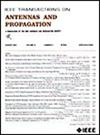Optimum Beamforming and Grating-Lobe Mitigation for Intelligent Reflecting Surfaces
IF 4.6
1区 计算机科学
Q1 ENGINEERING, ELECTRICAL & ELECTRONIC
引用次数: 0
Abstract
Ensuring adequate wireless coverage in upcoming communication technologies such as 6G is expected to be challenging. This is because user demands of higher data rate require an increase in carrier frequencies, which in turn reduce the diffraction effects (and hence coverage) in complex multipath environments. Intelligent reflecting surfaces (IRSs) have been proposed as a way of restoring coverage by adaptively reflecting incoming electromagnetic waves in desired directions. This is accomplished by judiciously adding extra phases at different points on the surface. In practice, these extra phases are only available in discrete quantities due to hardware constraints. Computing these extra phases is computationally challenging when they can only be picked from a discrete distribution, and existing approaches for solving this problem were either heuristic or based on evolutionary algorithms. We solve this problem by proposing fast algorithms with provably optimal solutions. Our algorithms have linear complexity, and are presented with rigorous proofs for their optimality. We show that the proposed algorithms exhibit better performance. We analyze situations when unwanted grating-lobes arise in the radiation pattern, and discuss mitigation strategies, such as the use of triangular lattices and prephasing techniques, to eliminate them. We also demonstrate how our algorithms can leverage these techniques to deliver optimum beamforming solutions.智能反射面的最佳波束成形和光栅光叶消减
在即将到来的 6G 等通信技术中,确保充分的无线覆盖预计将是一项挑战。这是因为用户对更高数据速率的需求要求增加载波频率,这反过来又会降低复杂多径环境中的衍射效应(进而降低覆盖范围)。智能反射面(IRS)是一种通过自适应地将传入的电磁波反射到所需方向来恢复覆盖范围的方法。这是通过在表面上的不同点明智地添加额外相位来实现的。实际上,由于硬件限制,这些额外相位只能以离散数量提供。如果只能从离散分布中选取这些额外相位,那么计算这些额外相位就具有计算上的挑战性,而解决这一问题的现有方法要么是启发式的,要么是基于进化算法的。我们通过提出具有可证明最优解的快速算法来解决这一问题。我们的算法具有线性复杂性,并对其最优性进行了严格证明。我们的研究表明,我们提出的算法具有更好的性能。我们分析了辐射模式中出现不需要的光栅环的情况,并讨论了消除这些光栅环的缓解策略,如使用三角网格和预分相技术。我们还演示了我们的算法如何利用这些技术提供最佳波束成形解决方案。
本文章由计算机程序翻译,如有差异,请以英文原文为准。
求助全文
约1分钟内获得全文
求助全文
来源期刊
CiteScore
10.40
自引率
28.10%
发文量
968
审稿时长
4.7 months
期刊介绍:
IEEE Transactions on Antennas and Propagation includes theoretical and experimental advances in antennas, including design and development, and in the propagation of electromagnetic waves, including scattering, diffraction, and interaction with continuous media; and applications pertaining to antennas and propagation, such as remote sensing, applied optics, and millimeter and submillimeter wave techniques

 求助内容:
求助内容: 应助结果提醒方式:
应助结果提醒方式:


